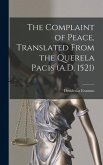The Italian War of 1521 26, sometimes known as the Four Years' War, was a part of the Italian Wars. The war pitted Francis I of France and the Republic of Venice against the Holy Roman Emperor Charles V, Henry VIII of England, and the Papal States. The conflict arose from animosity over the election of Charles as Emperor in 1519 20 and from Pope Leo X's need to ally with Charles against Martin Luther. The war broke out across western Europe late in 1521 when the French invaded Navarre and the Low Countries. Imperial forces overcame the invasion and attacked northern France, where they were stopped in turn. The Pope, the Emperor, and Henry VIII then signed a formal alliance against France, and hostilities began on the Italian peninsula. At the Battle of Bicocca, Imperial and Papal forces defeated the French, driving them from Lombardy. Following the battle, fighting again spilled onto French soil, while Venice made a separate peace. The English invaded France in 1523, while Charles de Bourbon, alienated by Francis's attempts to seize his inheritance, betrayed Francis and allied himself with the Emperor.
Bitte wählen Sie Ihr Anliegen aus.
Rechnungen
Retourenschein anfordern
Bestellstatus
Storno








